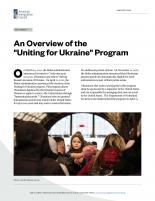- Fact Sheet
An Overview of the “Uniting for Ukraine” Program
Published
On March 24, 2022, the Biden administration announced its intent to “welcome up to 100,000 Ukrainians and others” fleeing Russia’s invasion of Ukraine. On April 21, 2022, the Biden administration announced the creation of the Uniting for Ukraine program. This program allows Ukrainians displaced by the Russian invasion of Ukraine to apply to come to the United States through “humanitarian parole.” Ukrainians who are granted humanitarian parole may remain in the United States for up to two years and may seek to renew that status for additional periods of time. On November 11, 2022, the Biden administration announced that Ukrainians granted parole are automatically eligible for work authorization as part of their parole status.
Ukrainians who want to participate in this program must be sponsored by a supporter in the United States and are responsible for arranging their own air travel to the United States. The Department of Homeland Security (DHS) implemented the program on April 25.
What is “Humanitarian Parole?”
The Immigration and Nationality Act (INA) grants DHS the discretion to temporarily allow certain non-U.S. citizens to enter or remain in the United States even if they lack any lawful immigration status or legal basis for admission. Individuals who enter the United States under these conditions are granted “parole.” DHS may only grant parole to someone if there are “urgent humanitarian or significant public benefit reasons” for doing so. The INA does not define what constitutes an “urgent humanitarian” or “significant public benefit” reason, leaving this up to the discretion of the executive branch. U.S. Citizenship and Immigration Services (USCIS) states that one “urgent humanitarian” reason might include protection against “targeted or individualized harm.” Individuals who are not eligible for admission into the United States but who can demonstrate an “urgent humanitarian” reason for being allowed to enter or stay in the country may be granted “humanitarian parole.”
Who is Eligible for the Uniting for Ukraine Program?
In order to be considered for humanitarian parole under the Uniting for Ukraine Program, an individual must meet all the following criteria:
-
Resided in Ukraine “immediately prior” to the Russian invasion (through February 11, 2022) and was displaced by the invasion.
-
Is a Ukrainian citizen possessing a valid Ukrainian passport, or the immediate relative of a Ukrainian citizen who is applying for the program.
-
Has a supporter in the United States who has filed a Declaration of Financial Support (Form I-134) on behalf of the applicant.
-
Has been vaccinated for measles, polio, and COVID-19.
-
Has passed all biometric and biographic screening and security background checks.
-
Possesses a valid Ukrainian passport.
How Does Someone Apply for the Uniting for Ukraine Program?
There are five steps to the application process for humanitarian parole under the Uniting for Ukraine program:
- The applicant must have financial support from someone in the United States. This “supporter” must file a Declaration of Financial Support online on behalf of the applicant in order for the applicant to be considered for the program.
- Once USCIS approves the Declaration of Financial Support, the applicant must create a myUSCIS account, provide all required biographical information, and attest that they have been vaccinated for measles, polio, and COVID-19. If a person hasn’t been vaccinated for those diseases, they must obtain the first dose of the necessary vaccine prior to travel.
- If USCIS approves the application for parole through the program, the applicant has 90 days to arrange their own air travel to the United States.
- Once the applicant has arrived in the United States, they will be inspected by U.S. Customs and Border Protection (CBP) and considered for humanitarian parole for up to two years. The applicant must receive a medical screening for tuberculosis within 90 days of their arrival in the United States.
- If the applicant is granted humanitarian parole, they are automatically eligible to work in the United States through their parole status.
Who Can Become a Supporter of an Applicant for the Uniting for Ukraine Program?
A supporter of an individual applying for humanitarian parole under the Uniting for Ukraine program must be lawfully present in the United States. This includes:
-
U.S. citizens.
-
Lawful permanent residents, lawful temporary residents, and conditional permanent residents.
-
Nonimmigrants in lawful status (that is, who maintain a nonimmigrant status and have not violated any of the terms or conditions of the nonimmigrant status).
-
Asylees, refugees, and parolees.
-
Recipients of Temporary Protected Status (TPS).
-
Beneficiaries of deferred action (including Deferred Action for Childhood Arrivals [DACA] and Deferred Enforced Departure [DED]).
What are the Shortcomings of the Uniting for Ukraine Program?
Refugee advocates generally support the decision of the Biden administration to offer refuge to Ukrainians displaced by the war with Russia. However, some advocates have also voiced concerns about the Uniting for Ukraine program. First of all, the two-year limit on humanitarian parole under the program seems arbitrary given that no one knows how long the war between Russia and Ukraine will last or how long it will take Ukraine to rebuild after the war. In addition, some advocates argue that the resources spent on Uniting for Ukraine would be better spent on strengthening and expanding the U.S. refugee program, which would help all people fleeing armed conflicts around the world rather than just Ukrainians. Others have also criticized the decision to provide protections for Ukrainians without creating similar parole programs for other nationalities experiencing conflict and displacement. For instance, Afghans fleeing Taliban rule after the U.S. withdrawal from Afghanistan are in desperate need of protection, but there is no ongoing formal special program that makes it easier for them to seek safety in the United States and many have been denied parole.
Help us fight for immigration justice!
The research is clear – immigrants are more likely to win their cases with a lawyer by their side. But very few can get attorneys.
Introducing the Immigration Justice Campaign Access Fund.
Your support sends attorneys, provides interpreters, and delivers justice.

Immigration Justice Campaign is an initiative of American Immigration Council and American Immigration Lawyers Association. The mission is to increase free legal services for immigrants navigating our complicated immigration system and leverage the voices and experiences of those most directly impacted by our country’s immigration policies to inform legal and advocacy strategies. We bring together a broad network of volunteers who provide legal assistance and advocate for due process for immigrants with a humane approach that includes universal legal representation and other community-based support for individuals during their immigration cases.

